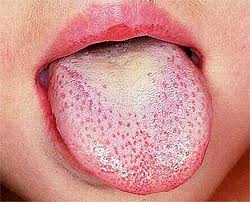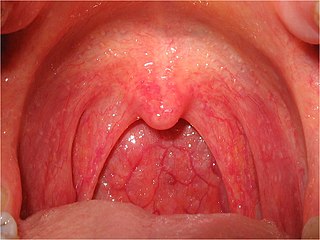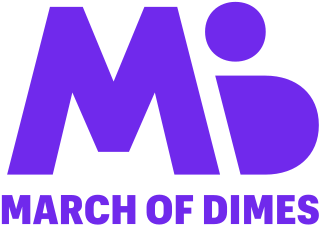Related Research Articles

Streptococcus is a genus of gram-positive coccus or spherical bacteria that belongs to the family Streptococcaceae, within the order Lactobacillales, in the phylum Bacillota. Cell division in streptococci occurs along a single axis, thus when growing they tend to form pairs or chains, which may appear bent or twisted. This differs from staphylococci, which divide along multiple axes, thereby generating irregular, grape-like clusters of cells. Most streptococci are oxidase-negative and catalase-negative, and many are facultative anaerobes.

Group A streptococcal infections are a number of infections with Streptococcus pyogenes, a group A streptococcus (GAS). S. pyogenes is a species of beta-hemolytic Gram-positive bacteria that is responsible for a wide range of infections that are mostly common and fairly mild. If the bacteria enters the bloodstream, the infection can become severe and life-threatening, and is called an invasive GAS (iGAS).

Scarlet fever, also known as scarlatina, is an infectious disease caused by Streptococcus pyogenes, a Group A streptococcus (GAS). It most commonly affects children between five and 15 years of age. The signs and symptoms include a sore throat, fever, headache, swollen lymph nodes, and a characteristic rash. The face is flushed and the rash is red and blanching. It typically feels like sandpaper and the tongue may be red and bumpy. The rash occurs as a result of capillary damage by exotoxins produced by S.pyogenes. On darker-pigmented skin the rash may be hard to discern.

Streptococcal pharyngitis, also known as streptococcal sore throat, is pharyngitis caused by Streptococcus pyogenes, a gram-positive, group A streptococcus. Common symptoms include fever, sore throat, red tonsils, and enlarged lymph nodes in the front of the neck. A headache and nausea or vomiting may also occur. Some develop a sandpaper-like rash which is known as scarlet fever. Symptoms typically begin one to three days after exposure and last seven to ten days.

Pharyngitis is inflammation of the back of the throat, known as the pharynx. It typically results in a sore throat and fever. Other symptoms may include a runny nose, cough, headache, difficulty swallowing, swollen lymph nodes, and a hoarse voice. Symptoms usually last 3–5 days, but can be longer depending on cause. Complications can include sinusitis and acute otitis media. Pharyngitis is a type of upper respiratory tract infection.

Sore throat, also known as throat pain, is pain or irritation of the throat. Usually, causes of sore throat include:

Rheumatic fever (RF) is an inflammatory disease that can involve the heart, joints, skin, and brain. The disease typically develops two to four weeks after a streptococcal throat infection. Signs and symptoms include fever, multiple painful joints, involuntary muscle movements, and occasionally a characteristic non-itchy rash known as erythema marginatum. The heart is involved in about half of the cases. Damage to the heart valves, known as rheumatic heart disease (RHD), usually occurs after repeated attacks but can sometimes occur after one. The damaged valves may result in heart failure, atrial fibrillation and infection of the valves.

March of Dimes is a United States nonprofit organization that works to improve the health of mothers and babies. The organization was founded by President Franklin D. Roosevelt in 1938, as the National Foundation for Infantile Paralysis, to combat polio. The name "March of Dimes" was coined by Eddie Cantor. After funding Jonas Salk's polio vaccine, the organization expanded its focus to the prevention of birth defects and infant mortality. In 2005, as preterm birth emerged as the leading cause of death for children worldwide, research and prevention of premature birth became the organization's primary focus.

Tonsillitis is inflammation of the tonsils in the upper part of the throat. It can be acute or chronic. Acute tonsillitis typically has a rapid onset. Symptoms may include sore throat, fever, enlargement of the tonsils, trouble swallowing, and enlarged lymph nodes around the neck. Complications include peritonsillar abscess (quinsy).
Action Medical Research, previously The National Fund for Research into Crippling Diseases, is a British medical research charity, founded in 1952, that focusses on funding research to prevent and treat disease and disability in babies and children.

Streptococcus agalactiae is a gram-positive coccus with a tendency to form chains. It is a beta-hemolytic, catalase-negative, and facultative anaerobe.

Hemolysis is the breakdown of red blood cells. The ability of bacterial colonies to induce hemolysis when grown on blood agar is used to classify certain microorganisms. This is particularly useful in classifying streptococcal species. A substance that causes hemolysis is a hemolysin.

Group B streptococcal infection, also known as Group B streptococcal disease or just Group B strep infection, is the infectious disease caused by the bacterium Streptococcus agalactiae. Streptococcus agalactiae is the most common human pathogen belonging to group B of the Lancefield classification of streptococci—hence the name of group B stretococcal (GBS). Infection with GBS can cause serious illness and sometimes death, especially in newborns, the elderly, and people with compromised immune systems. The most severe form of group B streptococcal disease is neonatal meningitis in infants, which is frequently lethal and can cause permanent neuro-cognitive impairment.

Cefdinir, sold under the brand name Omnicef among others, is an antibiotic used to treat pneumonia, otitis media, strep throat, and cellulitis. It is a less preferred option for pneumonia, otitis media, and strep throat which may be used in those with a severe allergy to penicillin. It is taken by mouth.

The Centor criteria are a set of criteria which may be used to identify the likelihood of a bacterial infection in patients complaining of a sore throat. They were developed as a method to quickly diagnose the presence of Group A streptococcal infection or diagnosis of streptococcal pharyngitis in "adult patients who presented to an urban emergency room complaining of a sore throat." The Centor criteria are named after Robert M. Centor, an internist at the University of Alabama at Birmingham School of Medicine.
Neonatal sepsis is a type of neonatal infection and specifically refers to the presence in a newborn baby of a bacterial blood stream infection (BSI) in the setting of fever. Older textbooks may refer to neonatal sepsis as "sepsis neonatorum". Criteria with regards to hemodynamic compromise or respiratory failure are not useful clinically because these symptoms often do not arise in neonates until death is imminent and unpreventable. Neonatal sepsis is divided into two categories: early-onset sepsis (EOS) and late-onset sepsis (LOS). EOS refers to sepsis presenting in the first 7 days of life, with LOS referring to presentation of sepsis after 7 days. Neonatal sepsis is the single most common cause of neonatal death in hospital as well as community in developing country.
Perianal cellulitis, also known as perianitis or perianal streptococcal dermatitis, is a bacterial infection affecting the lower layers of the skin (cellulitis) around the anus. It presents as bright redness in the skin and can be accompanied by pain, difficulty defecating, itching, and bleeding. This disease is considered a complicated skin and soft tissue infection (cSSTI) because of the involvement of the deeper soft tissues.

Granada medium is a selective and differential culture medium designed to selectively isolate Streptococcus agalactiae and differentiate it from other microorganisms. Granada Medium was developed by Manuel Rosa-Fraile et al. at the Service of Microbiology in the Hospital Virgen de las Nieves in Granada (Spain).

Neonatal infections are infections of the neonate (newborn) acquired during prenatal development or within the first four weeks of life. Neonatal infections may be contracted by mother to child transmission, in the birth canal during childbirth, or after birth. Neonatal infections may present soon after delivery, or take several weeks to show symptoms. Some neonatal infections such as HIV, hepatitis B, and malaria do not become apparent until much later. Signs and symptoms of infection may include respiratory distress, temperature instability, irritability, poor feeding, failure to thrive, persistent crying and skin rashes.
Anti-Deoxyribonuclease B titres are a quantitative measure of the presence of serologic antibodies obtained from patients suspected of having a recent group A (Beta-hemolytic) streptococcus bacteria infection, from Streptococcus pyogenes.
References
- 1 2 "Group B Strep Support - Who We Are: People involved: Executive Committee". GBSS. 2013-11-07. Retrieved 2013-12-09.
- ↑ "Group B Strep Support - Who We Are: People involved: GBSS Medical Advisory Panel". GBSS. 2013-11-07. Retrieved 2013-12-09.
- ↑ "Group B Strep Support - News and Events: Screening Committee". GBSS. Archived from the original on 2013-12-14. Retrieved 2013-12-09.
- ↑ "New Year Honour for charity founder". Mid Sussex Times. 2012-01-03. Retrieved 2013-12-09.
- ↑ "Group B Strep Support - Who We Are: What GBSS wants". GBSS. Retrieved 2013-12-09.
- ↑ "Charity aims to curb baby illness". BBC News. 2005-09-27. Retrieved 2013-12-09.
- ↑ "Pregnancy infection screening call". BBC News. 2003-08-02. Retrieved 2013-12-09.
- ↑ "Calls to test mums after baby catches serious illness". Yourlocalguardian.co.uk. 2008-04-23. Retrieved 2013-12-09.
- ↑ "Opportunities to prevent meningitis in young babies 'being missed'". The Daily Telegraph. Archived from the original on 2014-01-14. Retrieved 2013-12-09.
- ↑ "Screen pregnant women for group Strep B". OnMedica. 2008-02-27. Retrieved 2013-12-09.
- ↑ "Group B Streptococcus". Screening.nhs.uk. Retrieved 2013-12-09.
- ↑ "Arnold mum Lisa eaton is campaigning to raise awareness of Group B Streptococcus infection". Nottingham Post. 2010-03-15. Retrieved 2013-12-09.
- ↑ "Politicians support Group B Strep awareness campaign". Derry Journal. 2011-09-01. Retrieved 2013-12-09.
- ↑ "Two caring charities win prestigious award major award". Mid Sussex Times. 2013-10-31. Retrieved 2013-12-09.
- ↑ "MP calls for NHS testing to stop babies dying". West Sussex Gazette. 2013-06-25. Retrieved 2013-12-09.
- ↑ "Charity picks Ralf for UK campaign". Cambrian-news.co.uk. 2013-09-19. Archived from the original on 2013-12-13. Retrieved 2013-12-09.
- 1 2 3 4 5 6 7 8 9 "Group B Strep Support - Who We Are: High-Profile Support". GBSS. Retrieved 2013-12-09.
- ↑ "James Roby Testimonial 2013 - 2014". Jamesrobytestimonial.co.uk. Archived from the original on 2013-12-12. Retrieved 2013-12-09.
- ↑ "Why Saints' James Roby is raising funds for a cause close to his own heart (From St Helens Star)". Sthelensstar.co.uk. 2013-08-22. Retrieved 2013-12-09.
- ↑ "Routine tests in pregnancy needed, says MP Nadine Dorries". London Evening Standard. 2013-11-07. Retrieved 2013-12-09.
- 1 2 3 "Patrons - Group B Strep Support". Group B Strep Support. Retrieved 2018-03-01.